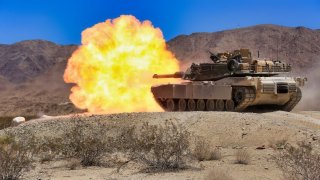Can America Defeat So Many Simultaneous Military Threats?
The Biden Administration’s fear of nuclear war is matched only by its aversion to the idea that nuclear escalation must be deterred by nuclear firepower.
The Biden Administration’s weak policy toward nuclear deterrence is one of the biggest problems the United States faces in dealing with the combined Russian and Chinse nuclear threat. In June 2023, White House National Security Advisor Jake Sullivan said, “…the United States does not need to increase our nuclear forces to outnumber the combined total of our competitors in order to successfully deter them. We’ve been there. We’ve learned that lesson.” There appears to be a rejection of the nuclear deterrence policy every U.S. administration has pursued for decades (i.e., a rejection of “second to none.”)
The Biden Administration is maintaining the fantasy that our national security can be advanced by a new nuclear arms control agreements with Russia. Its latest arms control proposal was rejected almost immediately by the Putin regime. As the recent report of the United States Strategic Posture Commission recognized: 1) “…there is no prospect of a meaningful arms control Treaty being negotiated with Russia in the foreseeable future…”; 2) “Over the past 20 years, Russia has either violated or has failed to comply with nearly every major arms control treaty or agreement to which the United States is or was a party.”; and 3) “…given Russia’s history of noncompliance and illegal treaty suspensions, and China’s continued intransigence on arms control dialogue, the United States cannot develop its strategic posture based on the assumption that arms control agreements are imminent or will always be in force.”
The Biden Administration’s efforts to prevent the destruction of Hamas (in the name of humanitarian concern about civilian casualties) is a strong indicator of the approach it would take in responding to a Russian attack on NATO. In a war against Russia or China or worse both, collateral damage cannot be the primary concern or the United States and the West will lose. Russia has the potential to win a war against NATO if NATO fights the same type of war it is forcing Ukraine to fight against Russia by prohibiting attacks on Russian territory with the weapons being provided. Russian nuclear escalation has to be deterred by firepower.
The Biden Administration’s no-win approach will likely result in a high casualty war of attrition. As Socor has pointed out, “Inadequate and inconsistent supplies of arms and munitions predetermined the stalling of Ukraine’s counteroffensive.” Under the Biden Administration’s likely approach, NATO also loses the advantage of the Soviet-style Russian command system. The centralized decision-making in Moscow is poorly suited to deal effectively with a fluid battlefield because it lacks tactical flexibility. Moreover, Russia could still win if it escalates to nuclear weapons in light of the West’s unilateral elimination of most of its tactical nuclear weapons. The Biden Administration’s fear of nuclear war is matched only by its aversion to the idea that nuclear escalation must be deterred by nuclear firepower.
Dr. Mark B. Schneider is a Senior Analyst with the National Institute for Public Policy. Before his retirement from the Department of Defense Senior Executive Service, Dr. Schneider served as Principal Director for Forces Policy, Principal Director for Strategic Defense, Space and Verification Policy, Director for Strategic Arms Control Policy and Representative of the Secretary of Defense to the Nuclear Arms Control Implementation Commission. He also served in the senior Foreign Service as a Member of the State Department Policy Planning Staff.
This article was first published by RealClearDefense.

